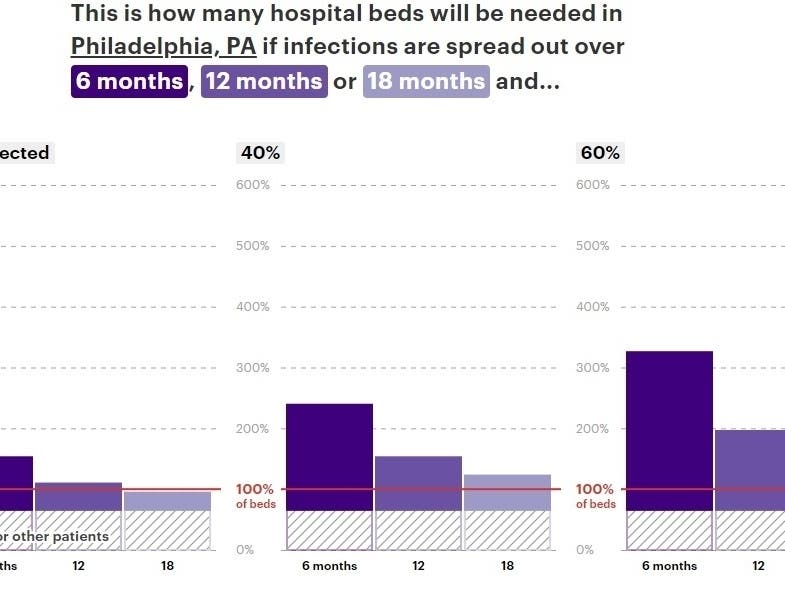Health & Fitness
Eastern PA Hospitals Lack Beds To Handle Coronavirus: Analysis
Local experts say that both preventative behaviors from patients, as well as social distancing by the general population, are necessary.
PHILADELPHIA, PA — Hospitals in southeastern Pennsylvania would be overwhelmed with coronavirus patients under most likely scenarios for infection rates, according to a ProPublica report released Tuesday. Local experts say that both preventative behaviors from patients, as well as social distancing by the general population, are necessary to control the situation.
The report, based on the latest data from the Harvard Global Health Institute, underscores the seriousness of the need to "flatten the curve," which health officials hope will slow the spread of the disease and keep hospital caseloads manageable. But even in what experts consider a moderate rate of infection, greater Philadelphia-area hospitals could meet only one quarter of the demand for beds, according to the ProPublica analysis.
Find out what's happening in Abingtonwith free, real-time updates from Patch.
Sign up for Patch updates here.
Pennsylvania announced its first coronavirus death Wednesday. There are 133 presumptive positive as of Wednesday morning, with dozens in the greater Philadelphia area. That's led to hundreds of people going into self-quarantine who have come into contact with known infected individuals, while hundreds of others await test results.
Find out what's happening in Abingtonwith free, real-time updates from Patch.
Of course, that's in turn led to an increased demand in testing. But the most pressing and consequential concern is that of basic care for those who will need it the most. And the projected numbers, for the Philadelphia area and elsewhere, paint a grim picture if the virus is not brought under control.
As of 2018, the greater Philadelphia area had 10,700 hospital beds, of which about 66 percent were occupied, potentially leaving only 3,360 beds open for additional patients. The bed count includes 1,260 beds in intensive care units, according to data from the American Hospital Association and the American Hospital Directory. Intensive care units are best equipped to handle the most acute coronavirus cases.
Under a "moderate scenario" outlined by researchers, in which 40 percent of the U.S. population contracts coronavirus over the next 12 months, Philadelphia-area hospitals would need to treat 277,000 coronavirus patients. That influx would require 9,240 beds over 12 months, which is 2.5 times the number of typically available beds, the ProPublica analysis said.
"The most important thing that we can do is to lower the curve, so we don't have that giant increase in cases," Dr. Bob A. Czincila, the medical director of emergency medicine at Einstein Medical Center Montgomery, told Patch Wednesday. "So we don't have people suffering. So we don't have a run of those cases where we don't have beds to take care of them."
Czincila also struck an optimistic note regarding Einstein's current load, saying the hospital is presently seeing a significantly lower volume of emergency room cases. He attributes that to many residents heeding the urges of health officials to stay home whenever possible. Officials recommend anyone showing symptoms to not go to a hospital or healthcare facility, but instead self-quarantine and call their healthcare provider for further instruction.
"So I think patients are listening," Czincila said, noting that deterring unnecessary visits is crucial. "If they can sequester, we might be able to get a handle on it, and get to the point where we can avoid the scenario of being inundated with an overwhelming number."
In the ProPublica model, intensive care units would be especially overwhelmed in the Philadelphia area, as the region has only 550 available ICU beds: 3.6 times less than what's expected to be needed to handle severe cases.
Even in the report's "best-case scenario," in which only 20 percent of the population is infected over 18 months, Philadelphia region hospitals would fall slightly short of the number of beds needed. And in the "worst-case scenario," where 60 percent of adults are infected within six months, Philadelphia-area hospitals would be at an estimated three times capacity.
The study assumed a fifth of infected adults would need to be hospitalized with an average hospital stay of 12 days, based on data from China.
Tower Health, which owns Phoenixville, Pottstown, Chestnut Hill, Reading, Brandywine, and St. Christopher's hospitals, said they are monitoring bed capacity on an hourly basis.
"Each of our facilities will work cooperatively to handle patient volumes," a spokesperson for Tower Health told Patch. "We continue to remind our communities to take the proper precautions to stay safe and healthy including, practicing proper hand hygiene, avoid touching your face, avoiding large crowds, and practicing the recommended social distancing."
Hospitals have already been preparing for an unprecedented influx of patients. Most began canceling elective surgeries earlier this month, and many have been trying to discharge patients sooner.
Einstein, along with others, are getting creative with ways to expand their capacity and stay as safe as possible at the same time. In the emergency department, they're working on drive-up care, where patients would not need to come into the hospital, thus limiting the exposure to healthcare workers.
Primary care offices could be repurposed as testing centers. Similarly, Montgomery County officials are setting up a drive-thru testing site.
But even with those efforts, 40 percent of the American population will be living in areas that could run short of hospital beds. Hospital executives project that they will need to increase capacity by 20 to 70 percent, depending on size and location.
ProPublica, a Patch Partner, is a nonprofit newsroom that investigates abuses of power and other public concerns. Click here to see ProPublica’s full story and specifics about hospitals in your area.
Get more local news delivered straight to your inbox. Sign up for free Patch newsletters and alerts.
